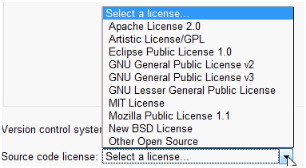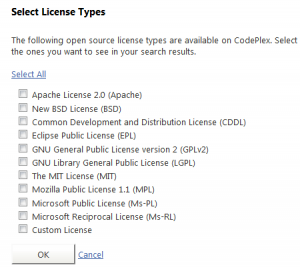Google and Microsoft Open Source Project Hosting Policies
Fabrizio Capobianco – Funambol CEO and AGPL’s prophet and forerunner – with his recent blog entry pointed me to Chris Di Bona‘s article about Google’s decision to tolerate the AGPL, and I took the chance to make a writeup about how Google and Microsoft differ in their open source software hosting facilities.
 Licenses. Google Code makes the following choices available. Despite the AGPL is now admitted, as OSI Director Simon Phipps noticed before Google code doesn’t list AGPL and other ‘minority’ licences as an option (by selecting the “Other Open Source” you can write at hand any other OSI approved license).
Licenses. Google Code makes the following choices available. Despite the AGPL is now admitted, as OSI Director Simon Phipps noticed before Google code doesn’t list AGPL and other ‘minority’ licences as an option (by selecting the “Other Open Source” you can write at hand any other OSI approved license).
But, are the missing licenses a minority?
Not quite, at least reading BlackDuck Top 20 most used licenses list, in fact the Microsoft Public License has been stripped off from the list.
 Also looking at the list of Microsoft’s CodePlex hosting platform set of allowed licenses not all most used licenses show up in the list (among missing licenses the Artistic License, and the GPLv3). By selecting the “Custom License” apparently you can choose any license, proprietary included.
Also looking at the list of Microsoft’s CodePlex hosting platform set of allowed licenses not all most used licenses show up in the list (among missing licenses the Artistic License, and the GPLv3). By selecting the “Custom License” apparently you can choose any license, proprietary included.
Searching code. If we search for a program we can’t specify a given license using Google Code search, but “labels” let you sharpen the search.
Microsoft CodePlex search allows to sort projects by few different criteria (downloads and rating included) and provides an advanced search that allows to specify “Development Status” and “License Type”. On the contrary Google considers download statistics a private information, a decision that priviliges privacy versus transparency.
Version control systems. Google makes available two choices, both based on open source tools (Subversion and Mercurial), while Microsoft allows users to use its proprietary Team Foundation Server (made available also via Subversion clients) and Mercurial.
Google and Microsoft are both playing on “intersecting highways” – Ground which forms the key to three contiguous states, so that he who occupies it first has most of the Empire at his command, is a ground of intersecting highways” (Sun Tzu’s definition) – and Sun Tzu hints at this:
On ground of intersecting highways, I would consolidate my alliances.
Both platforms keep evolving, either making new features available or collaborating with other open source projects, and are both working on target end-use “species”. Any decisions around licensing, available tools, import/export facilities, users’ reviews and feedback, etc can make a difference.
For example looking at the AGPL incremental rate, I noticed that among copyleft licenses the AGPL was the fastest-growing license. Thanks to BlackDuck Open Source License page I easily managed to make an update, see the table below.
Make or not AGPLÂ projects first class citizens is one of these strategic decisions.


Dana Blankenhorn 2:23 pm on September 17, 2010 Permalink
Great one, Roberto. The rise of AGPL had been going unremarked upon until this excellent post.
Google and Microsoft Open Source Project Hosting Policies | Open Hacking 4:20 pm on September 17, 2010 Permalink
[…] posted here: Google and Microsoft Open Source Project Hosting Policies This entry was posted on Friday, September 17th, 2010 at 10:08 am and is filed under News, […]
Roberto Galoppini 6:54 pm on September 20, 2010 Permalink
Thank you Dana. Despite the AGPL has not been sponsored enough – not even from who has been saying that the AGPL was a ‘major action item’ – it seems like if its importance is rising.
Focus Group Open Source: Licenze d’uso | Focus Group Open Source Blog 12:04 pm on November 18, 2010 Permalink
[…] alla cosidetta “proprietà intellettuale”, chiudendo infine con qualche dato relativo all’emergere di determinate licenze e di particolari modalità di utilizzo di alcune di […]
Carlo Strata 2:13 pm on December 3, 2010 Permalink
I’m very happy for AGPL rise because of the spreading cloud and online computing: it can grant the openness, the quality and the fast development of the underlying – online – applications.
This as well as GPL had been (and still is) for offline applications.
I think we must contribute in people minds that AGPL is a better GPL not a “dirty” one, like others may be.